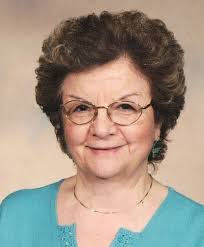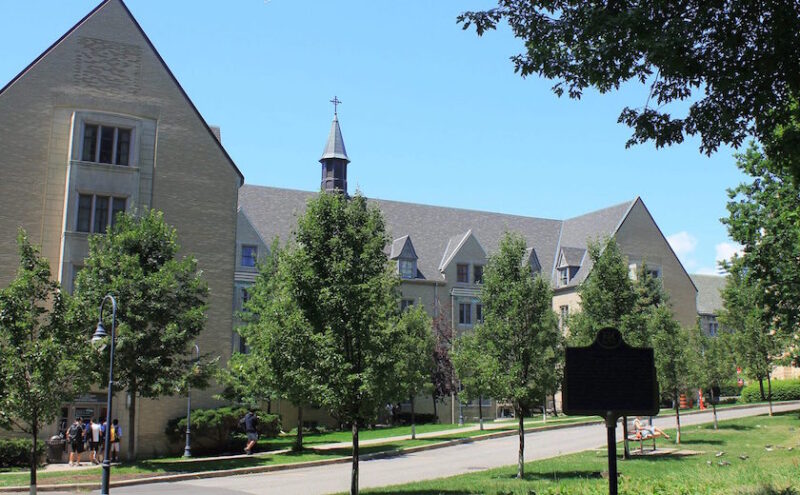Angela Convertini graduated from St. Michael’s College in 1977, majoring in French and Italian, and received her Bachelor of Education from OISE in 1978. She completed the Degree of Master of Science in Education from Niagara University in 1986. In 1992 she received her Ontario Supervisory Officer certification (SOQP). In September 1978 she was hired by the then-MSSB and began her career in Catholic education at Loretto Abbey, serving as teacher and then Vice Principal. In 1989 she was Principal on Assignment with responsibility for Special Education in secondary schools, then Principal at Loretto College School, Cardinal Newman (now St. John Henry Newman Catholic High School), and Cardinal McGuigan Catholic High School. In 2004 she was seconded from the TCDSB to be Dean at Loretto College Women’s Residence, at St. Mike’s, where she remained until 2016. After several years of assisting her beloved parents in Niagara Falls, and volunteering at Queenston Place Retirement Residence, she has returned to Toronto and is presently serving on the Loretto Abbey Parent Association’s Spirit and Culture Committee, and on the Board of Directors of Catholic Charities of the Archdiocese of Toronto.
As we prepare to celebrate the 175th anniversary of the Loretto Sisters’ landing in Toronto on September 16, 1847, I have reflected on my Loretto experience, and the impact it has had on my life and my time at St. Mike’s.

My introduction to Loretto goes back to elementary school in Niagara Falls, where the Loretto Sisters were my teachers and principals. From there I went to Loretto Academy, and then to St. Michael’s College and Loretto College Women’s Residence, where I was active in student government and became a Don. In 2004 I returned to be Dean of Women.
A Loretto education meant being steeped in the values of Loretto founder Mary Ward. Justice, integrity, and freedom were not just words for us. These values became a part of our decision -making, our interactions with others and, in short, of our lives.
I have so many wonderful memories of my years in residence at Loretto College. The many social activities in conjunction with St. Mike’s, including the weekly Friday night pubs in the COOP and the coffee houses where we could share our musical and literary talents, were great opportunities for the young men of St. Mike’s to elevate their language and behaviour in the presence of the young women of Loretto!
Life at St. Mike’s was not all social. We did, in fact, attend classes and study. I fondly remember Fathers Charles Principe, and Richard Donovan, whose classes in French language and literature provided a wonderful foundation for me as a future French teacher. Father Belyea’s lectures were stimulating, thought-provoking and always generated interesting, and sometimes heated, discussion as varying points of view were debated.
In those days, the student liturgies in St. Basil’s basement chapel were very special. We at Loretto were greatly involved in the planning of the “folk Masses”. We actively participated as lectors, musicians, and members of the choir. The Basilian priests were not just celebrants at Mass once a week but were present in every aspect of life on campus, from the Chapel and the classroom to the COOP.
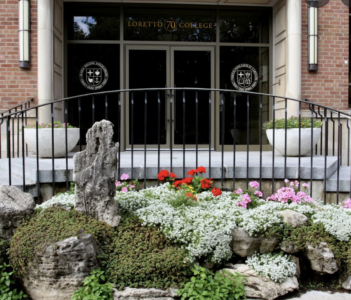
During the 70’s social justice was front and centre at Loretto. Through the many workshops and talks we attended and sponsored we became aware of the terrible conditions under which the workers in California migrant camps were living and working. Under the leadership of our Dean at the time, Sister Carolyn Dawson, we decided to support labour activist Cesar Chavez by boycotting lettuce and grapes at the residence. Furthermore, we began to speak of the injustice with our families and friends, thus broadening the scope of our boycott, while educating the larger community.
The Loretto Sisters have made major contributions to St. Mike’s academically. Like many before them Sisters Olga Warnke, Frances Nims and Marion Norman were extremely well-respected and loved professors for many years at St. Mike’s, and I dare say, have become legends.
During my years as Dean, the Loretto Sisters were in the forefront regarding environmental issues. They were the first on campus to install solar panels on the roof of the College, and to renovate to conserve hydro and water. With incredible patience, the Sisters, the staff, and the students survived the many months of major renovations. In the end all were delighted with the results.
In collaboration with the Mary Ward Centre at Loretto College, Loretto and St. Mike’s students had an opportunity to minister to the homeless in Toronto. On Saturday mornings throughout the winter months, the students would gather at Loretto to make sandwiches and prepare hot drinks to take along on the homeless walk. This ministry proved to be a deeply spiritual experience for many.
In essence, I believe the contribution of Loretto to St. Michael’s College can be summarized by the lessons we strive to inculcate in each of our students, whether they are in our classrooms, or in our residences.
Loretto empowers young women to challenge injustice and to work toward just and meaningful policies and laws. It teaches love of God, love of self and neighbour, and stewardship of creation. Loretto teaches endurance, resilience, determination and even joy in hardship. Loretto also teaches hospitality, generosity, openness, optimism, and laughter.
I truly believe that Mary Ward’s values of justice, integrity, and freedom contribute to making St. Michael’s College the wonderful community it is, and to making the world a better place.
Please join the Loretto Sisters and Associates at St. Michael’s Cathedral at 10:00 a.m. on September 17, to celebrate the 175th anniversary of the arrival of the Loretto Sisters from Ireland. Learn more about the history of the Lorettos and their contributions to the community from our 100 Years of Women’s Education at St. Michael’s College timeline.
Read other InsightOut posts.
Sr. Sarah Rudolph is a Loretto Sister and the director of the Mary Ward Centre, a ministry of the Loretto Sisters focused on education, justice and spirituality. One of her areas of work is children’s rights advocacy, including the rights of girls and fostering girls’ participation at the United Nations through the CJ/IBVM NGO to the UN. She has a deep love for Ignatian spirituality and shares it through a monthly women’s prayer group and outreach to women who have experienced homelessness through the Ignatian Spirituality Project.
Motivated by Love
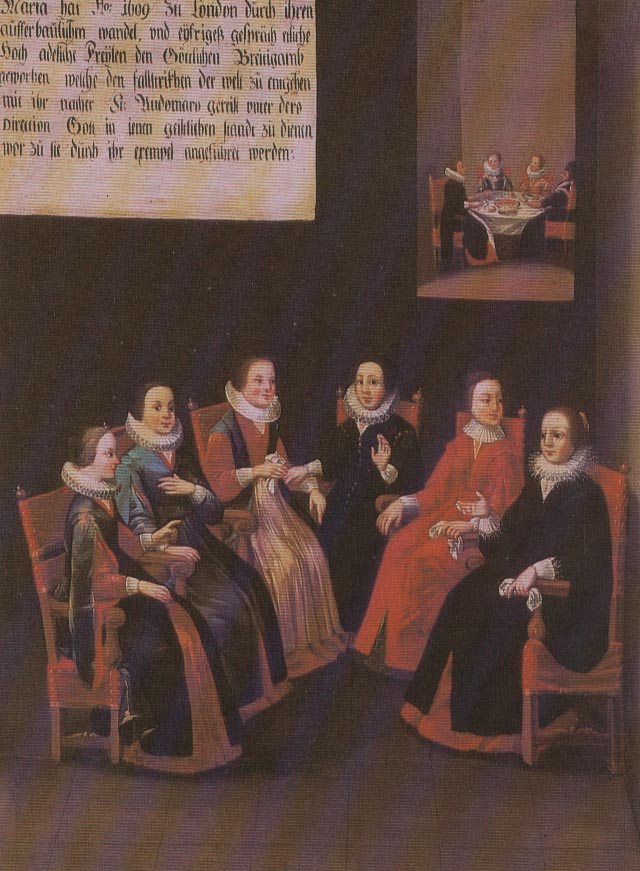
“I was so apt for friendship and ever loved more than ordinary.”
These words of Mary Ward (1585–1645), founder of the Congregation of Jesus and Institute of the Blessed Virgin Mary, commonly known as the Loretto Sisters, written in the 17th century, have a rich resonance for her companions today. As a member of the Loretto Sisters, these words remind me that Mary Ward Women are relational women committed to a deep relationship with God and others, motivated by love, as the driving force that urges us on in mission. Mary’s capacity for loving friendship, and for working with others for the sake of mission, offer an enduring inspiration.
Her early companions were diverse. They are often remembered in this image from The Painted Life of Mary Ward, the open circle of friends—(right to left) Mary Ward, Winefrid Wigmore, Susanna Rookwood, Catherine Smith, Jane Browne, and Mary Poyntz. These women were the first to join her in religious life, however, her circle of friends extended far beyond the members of her Institute, and included religious and political figures, and members of European monarchy. Among her closest companions were her dear friends, Robert Wright and Henry Lee (Lee referred to Mary as his “best friend”), who journeyed with her from Flanders, across the Alps, to Rome.
What does Mary Ward’s extraordinary capacity for love and friendship have to do with the Loretto Sisters and their relationship with St. Mike’s?
The bond of love and friendship for mission and service to the Church, the academy, and the common good, has existed between the Loretto Sisters and St. Mike’s for over a century. The establishment of Loretto College, from its first foundation at the Loretto Abbey Motherhouse on Wellington Street to the residence building today on St. Mary Street, is closely connected to the evolution of St. Mike’s.
In January 1911, a historic federation between the Congregation of the Sisters of St. Joseph, St. Michael’s College, and the Loretto Sisters was formed to create the official Catholic College of the University of Toronto. The Loretto Sisters provided not only a residence for women pursuing advanced education but also professors for Classics, Modern Languages, and Philosophy classes which were given in their own College building. The motto of Loretto College, Veritas fons Lucis et Caritas, or “Truth is the source of light and charity” complements the Basilian motto of St. Mike’s, Bonitatem et disciplinam et scientiam doce me, which means “Teach me goodness, discipline and knowledge.” Our institutions are committed to education for the good of the human person, for the Church, and for the world. We strive to form men and women who pursue truth, are dedicated to the attainment of Christian virtue, and are able to meet the challenges of the contemporary world.
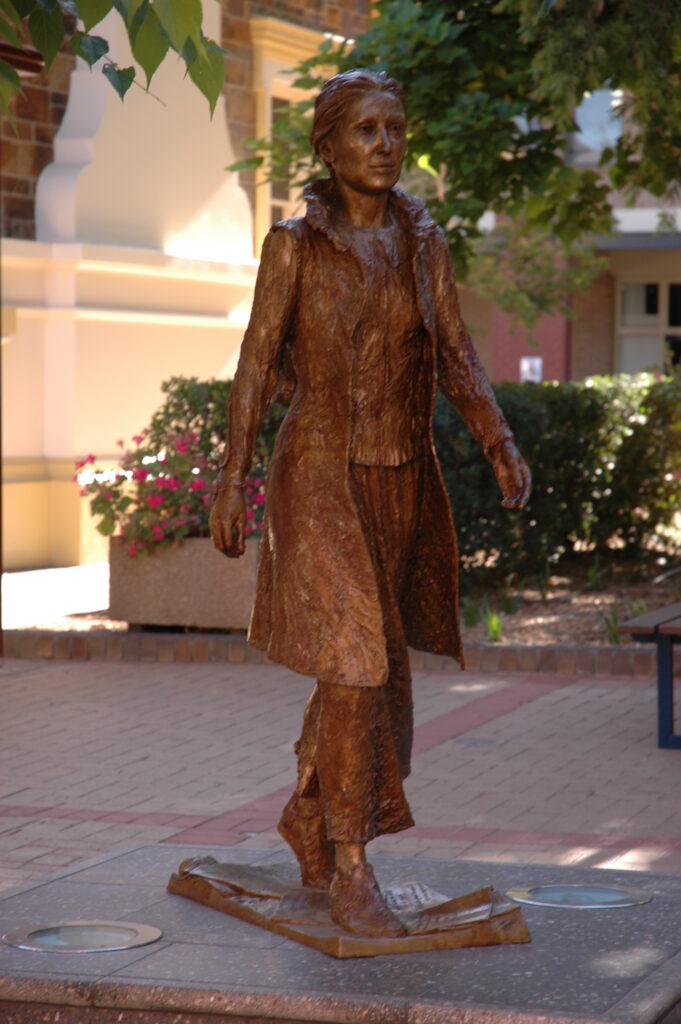
From these beginnings have emerged generations of friendship and partnership between St. Mike’s and the Loretto Sisters. Sisters have studied at St. Mike’s, taught courses, served as chaplains, and ministered to students through the residences. This friendship and partnership, however, is not simply one for the history books. Today there continues to be strong collaboration through Loretto College and the Mary Ward Centre. We have shared interests and collaborate on interfaith dialogue. We participated together in a recent initiative at St. Basil’s Parish on Indigenous relations in the Church. And through Campus Ministry, we are actively working together to engage students in a process of listening and conversation for the 2023 Synod on Synodality.
While a student at Regis College, I had the privilege of working closely with colleagues at St. Mike’s on the Regis-USMC federation process. I prayed with students from St. Mike’s, journeying together through the Ignatian First Spiritual Exercises. I worked collaboratively with St. Mike’s students on events, and of course, I was fortunate to take theology courses through the Faculty of Theology. Each of these experiences has given me insight into our valued partnership, rooted in loving friendship and a desire for service.
As the Loretto Sisters and our Sisters in the Congregation of Jesus celebrate Mary Ward this week, giving thanks for her birth on January 23 (1585) and her death on January 30 (1645), we are also celebrating the joy of mission shared with centuries of companions, friends, and collaborators. We invite our friends at St. Mike’s to celebrate with us, to share in the reality of one woman’s vision and her desire to do all for the greater glory of God.
Read other InsightOut posts.
The University of St. Michael’s College is mourning the loss of Sr. Johanna D’Agostino, IBVM, who served the community in numerous ways over her long career.
Many will remember Sr. Johanna from her days as part of the Campus Ministry team, where she worked from 1985-1990. Before joining the ministry team she also served as Dean of Women at Loretto College, so she was a familiar face on campus.
From 2006 to 2012 she served as the representative of the university’s founding women’s orders on the Collegium, St. Michael’s governing body. A Master of Religious Education graduate from the university’s Faculty of Theology, she also acted as a field placement supervisor for the Faculty’s Master of Divinity program.
“Johanna was a wonderful support and inventive member of the team,” recalls Fr. James McConica, CSB, who was St. Michael’s president when Sr. Johanna was in campus ministry. “It was she who made a success of the Parents’ Day project I launched when I realized how many of our first-year intake were the first members of their families to attend university. But her contribution ranged far beyond that, into most areas of student activities and social life.”
An article dated Oct. 16, 1986 in The Mike, St. Michael’s student newspaper, announced that Sr. Johanna was moving from a part-time position to a full-time one, forming a new chaplaincy team with Fr. John Gaughan, CSB. The article noted that the campus ministry team was to provide the St. Michael’s community with both religious and supportive programs, including a daily mass at 11:15 in the student chapel, a Sunday folk mass, evening and weekend retreats, private counselling and other supports. Sr. Johanna was also responsible for introducing what the article called “a relatively new programme,” the Rite of Christian Initiation of Adults (RCIA), designed for adults seeking to enter the Catholic Church.
Sr. Johanna’s career in education was impressive. She served as a teacher and a principal, and wrote textbooks on teaching at the elementary level. She worked as a primary education consultant, and taught in the Teacher Education program at Brock University. She was elected her order’s Vicar General in 1999.
She left St. Michael’s to take up a position at Catholic Charities of the Archdiocese of Toronto, offering workshops to parishes on pastoral skills. She rounded out her career as the Pastoral Assistant at Blessed Sacrament Parish in North Toronto.
A busy volunteer, Sr. Johanna lent a hand at the Canadian Red Cross, Development and Peace, and with her order’s justice and peace work.
A private funeral will be held at Presentation Manor on Friday. A memorial mass will be held at a later date.
The St. Michael’s community extends its sympathy to the Institute of the Blessed Virgin Mary on the loss of Sr. Johanna.
Move-out weekend traditionally sees the mass exodus of 550 residence students moving into apartments, heading to the airport, or being picked up by mom and dad. It’s a day of frenetic activity that includes tearful goodbyes, warm hugs of welcome and long line-ups of cars on St. Mary and St. Joseph streets.
This year however, the mass exodus took place in mid-March after the prime minister announced that everyone who could go home, should go home. By the time late April rolled around, the SMC Residence only had about 90 students left, mainly from countries where international travel was either restricted or financially prohibitive. So what’s happening with these student now?
“St. Mike’s is committed to housing students through the summer who don’t have anywhere else to go,” says Dean of Students Duane Rendle, “including students who weren’t previously living here, but who now find themselves without options.” Some of the students who took advantage of Dean Rendle’s offer included about a dozen women from Loretto College.
The Loretto College Residence is located just across the street from St. Mike’s and provides accommodation to 120 women during the academic year. Although Loretto is an independent college with their own staff and governance structure, their Catholic identity and proximity to St. Mike’s have earned them the moniker of “SMC’s sister College.” In mid-April, St. Mike’s agreed to provide housing for any Loretto students who were unable to return home, which has in turn allowed Loretto to close down for the summer. “It just didn’t make sense for Loretto to keep their entire building open to house such a small number of students. We were more than happy to have them to join us here at St. Mike’s,” explains Dean Rendle.
The small community of summer students who remain are being housed in either Sorbara Hall or the Historic Houses. All rooms in Sorbara have their own sink, which cuts down on the need to share common facilities, and the Historic Houses already have small populations, which helps to maintain social distancing. Chartwells, the College’s food service provider, is still providing food service to students, albeit in a takeaway form. Residents can purchase a “Dine on Campus” plan consisting of either 50 or 100 meals depending on their length of stay.
If you are a St. Mike’s student with a precarious housing situation, email smc.residence@utoronto.ca for more information on summer rates and availability.

